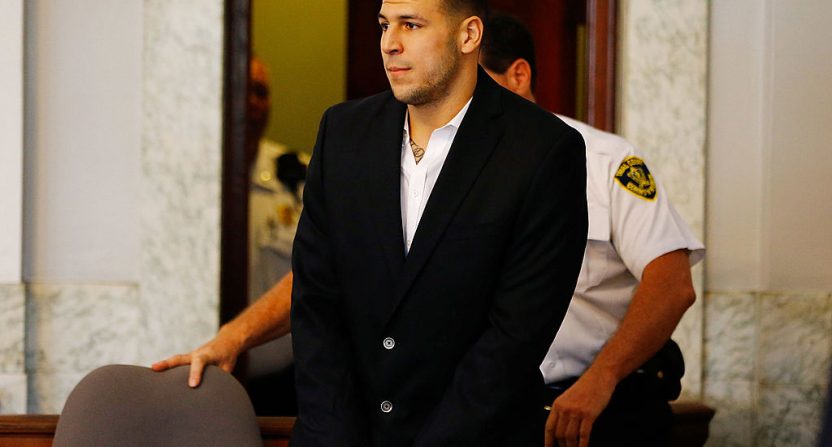In an effort to support medical research concerning CTE, the family of former New England Patriots tight end Aaron Hernandez decided to donate his brain to research in an attempt to determine whether or not he was battling CTE.
Hernandez’s death was officially was ruled a suicide on Thursday by the Office of the Chief Medical Examiner and his brain was released.
“The Office of the Chief Medical Examiner released Mr. Hernandez’s body on Wednesday, but withheld some tissue including his brain until the cause and manner of death was determined,” said District Attorney Joseph D. Early, Jr. in a statement. “Now that the cause and manner of death have been determined, the brain will be released to Boston University’s Chronic Traumatic Encephalopathy Center as Mr. Hernandez’s family wishes.”
Earlier in the day, Hernandez defense lawyer Jose Baez called on the state to release Hernandez’s brain, questioning the legality of their holding it.
“It is our position that they are holding Aaron Hernandez’s brain illegally,” Baez said. CTE is a condition, caused by repetitive brain trauma, that has affected some football players. Baez said he was not contending that Hernandez had the condition, but that the family wants to know whether he did.
[…]
“If we don’t get answers and answers quickly, we’re going straight to court,” said Baez. He said he would seek an emergency court hearing to secure the brain.
Hernandez was found dead in his Massachusetts prison cell earlier this week after apparently committing suicide by hanging. Baez and his legal team have committed to conducting their own investigation of the apparent suicide, which was also under investigation by the state. The reason the defense team wants to conduct their own investigation is because the suicide came off as a surprising development, although there were apparent signs of warning in the past while Hernandez was imprisoned. He was relocated to a segregated cell in December after it was discovered he was in possession of a homemade knife.
Hernandez was sentenced to prison for a first-degree murder charge and has been on suicide watch. But that may only play a small part of the potential research to be done regarding CTE. As Hernandez is a former football player, the information that can be gathered from his brain would contribute to the ongoing efforts to research and learn as much about football and head trauma as possible. Hernandez’s behavior and actions may not be specifically linked to playing football, but it would be fascinating to know more about his brain for future context.
Just to be clear, CTE is absolutely no excuse for murder, but individuals like Hernandez do raise questions. We may never get the real answers behind Hernandez’s actions, but there is a chance he can leave something to benefit from an otherwise waste of life.







